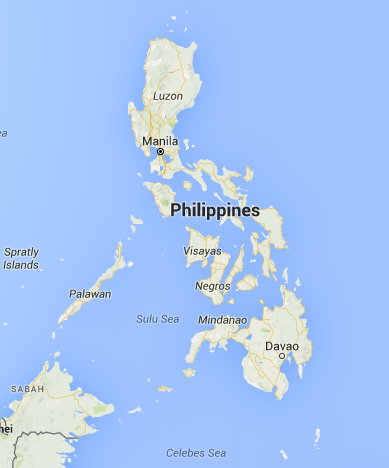Health Insurance
Health Insurance for Expatriates in Philippines
Welcome to our country guide page providing economic, healthcare and health insurance information to expatriates living in the Philippines. The country is in South West Asia located in the western Pacific Ocean and is made of 7,000 islands with just 11 of them inhabited. The capital city is Manila and other main cities include Quezon City, Angeles and Cebu.

Philippines in numbers
| Area | 77,381 sq. km* |
| Population | 3,867,535** |
| Expat Population | 190,000*** |
| Life Expectancy | 77 years** |
Source: World Bank
The philippines has a rich history dating back to the 16th century when the Spanish arrived on the island and remained as rulers until the US took over in the early 20th Century. The country gained its independence in 1946, after a period of self-rule, and has seen a great deal of upheaval over the years with the ousting of leaders and military coups.
There is still a Spanish and US influence in the country. Both Spanish and English are spoken along with Filipino (Tagalog) and over 120 regional languages. The Philippines now ranks as one of the world’s most promising new-industrialised countries, with exports on the increase. The country has also built a thriving tourism industry although this is frequently hit by volcanic eruptions, earthquakes, storms and typhoons as much of the country is mountainous, with around 20 active volcanoes.
The population is rising fast with one of the highest birth rates in Asia and there are predictions that the population could double in the next three decades.
Healthcare in the Philippines
The Philippines has a universal health coverage system called PhilHealth which provides free healthcare for the poor. Those who can afford it such as employers, employees and the government, subsidise those who cannot. Payments vary and depend on earnings and age. Expats cannot usually access the system – except under certain circumstances such as being married to a national – and should take out private health insurance.
Both private and public hospitals in the philippines offer good facilities. Medical staff have often trained, or have experience of working, in the US so the standard of healthcare is generally high. As expected the best hospitals are in Manila with facilities as good as any western hospital. Many hospitals throughout the country, both public and private, also provide high quality care. In remote areas healthcare is less available and to a lower standard.
Private medical insurance in the Philippines
Private healthcare is not expensive in the Philippines so private medical insurance can be affordable dependent on needs. International private medical insurance plans include repatriation for emergencies to other Asian countries such as Malaysia or Thailand, both of which offer superior overall healthcare facilities.
Official advice is to avoid travel to many parts of southern philippines, south-west Mindano and the Sulu, due to terrorism and clashes between the military and terrorist groups. This may have a bearing on private medical insurance plans when travelling to these regions.
Important health information before you go
You should be up to date on routine vaccinations. Some vaccines may also be required for travel.
|
Routine Vaccines |
It’s important to be up to date on routine vaccinations, including the varicella (chickenpox) vaccine, measles-mumps-rubella (MMR), diphtheria-tetanus-pertussis vaccine, polio and flu. |
|
Hepatitis A |
The CDC recommends a Hepatitis A vaccine as this disease can be contracted through contaminated water in the Philippines, even in the major cities. |
|
Typhoid |
Contaminated food or water can lead to Typoid infections in the Philippines. The CDC recommends a Typhoid vaccine, especially when visiting smaller cities or rural areas. |
|
Japanese Encephalitis |
For those visiting the Philippines for more than a month, the Japanese Encephalitis vaccine is recommended. Where you are visiting and the time of year are additional factors. |
|
Rabies |
Although rabies can be found in bats and other animals in the Philippines, it is not a major risk to most travellers. It is only recommended in certain instances for example working with or around animals. |
|
Malaria |
The best advice is to avoid mosquito bites to prevent malaria in the philippines. Talk to your doctor about how you can prevent malaria and for additional advice. |
More information on vaccines can be found here.
Prescription drugs and pharmacies in the Philippines
Prescriptions are required for drugs from pharmacies in the philippines although drugs are not expensive. There are many pharmacies to choose from and most pharmacists are well trained and are able to offer advice.
Food hygiene and health
Water borne diseases such as typhoid and cholera are prevalent so drink or use only boiled or bottled water and avoid ice in drinks. Ensure vegetables are washed well. Dengue, which is mosquito borne, is endemic in the philippines and Malaria is a constant threat. Leptospirosis, also known as Weil’s disease, is transmitted in the urine of rats and other animals and is a hazard, as is Rabies. Cases of the Zika virus have recently been reported so look for advice and take the precautions.
Medical Emergencies
If you have a medical emergency call 117 this covers all emergency services nationally. There are also stand-by ambulances available.
Healthcare Facilities
The top Philippine hospitals include:
The Medical Centre in Alabang – (+632) 807-8189 / 775-0511
The Asian Hospital – (+632) 771-9000
The Makati Medical Centre – (+632) 8888 999
The Medical City – (+632) 988-1000
St Lukes Medical Centre – (+632) 789-7700
